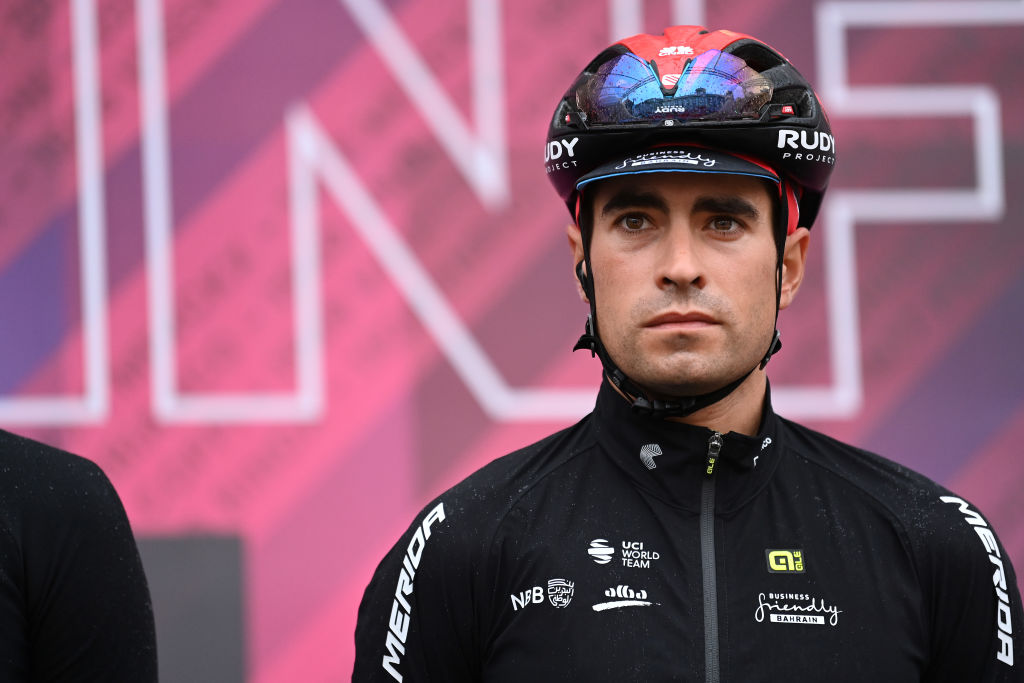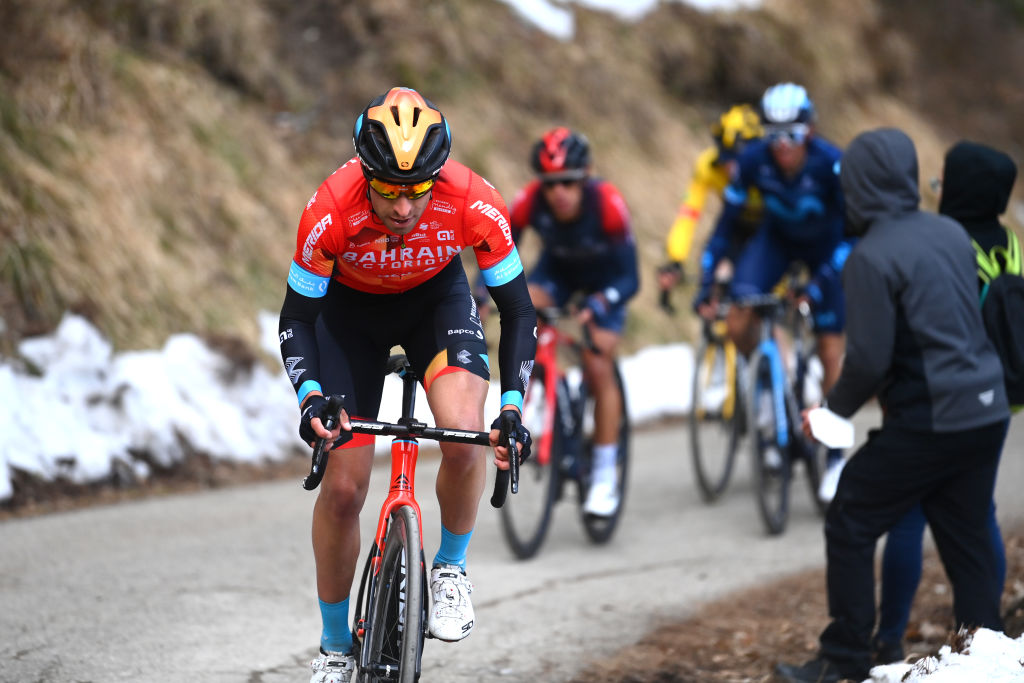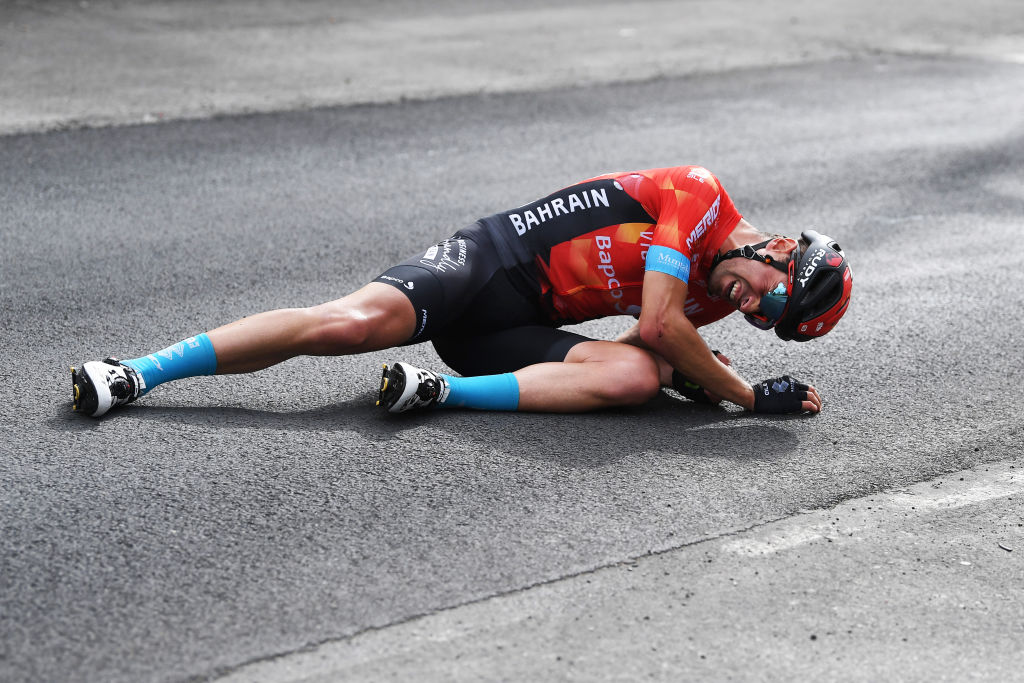The eternal optimist - Mikel Landa at the 2022 Giro d’Italia
After 2021 horror crash, Basque star back at Italian Grand Tour

The Flemish have a saying, 'optimists live longer than pessimists', and when it comes to Mikel Landa at Grand Tours in general and in the Giro d'Italia in particular it's a motto that fits the 32-year-old perfectly.
In last year's Giro, for example, Landa was in great early shape and even stole a march on some of the other GC favourites on the first major climb along with eventual winner Egan Bernal (Ineos Grenadiers) and Education First's Hugh Carthy - only to crash out with serious injuries the very next day.
Reel back to 2019, and with 24 hours to go Landa was en route to giving Movistar a second podium place alongside overall winner Richard Carapaz, but came unstuck in the final time trial and had to settle for fourth by a scant eight seconds behind Primož Roglič.
And then in 2017, he crashed heavily on the Blockhaus stage (a climb that will feature this year as well, too) when a badly parked motorbike wreaked havoc in the peloton. Cue one 27-minute time loss, and while able subsequently to claim the King of the Mountains title, he abandoned any hope of a decent GC ride as a result.
And so it goes on: in 2016, after a superb mid-race time trial, he then had a severe stomach upset, lost a spectacular amount of time on a seemingly inoffensive second week stage and had to quit. Even in the 2015 Giro d'Italia, when he took third, his one Grand Tour podium to date, his room for manoeuvre was severely hampered (and in fact directly limited by the Italo-centric Astana management at some points) by having Italian podium finisher Fabio Aru as a teammate.
Viewed from the outside, Landa's Grand Tour universe comes across as one where it seems given his talent and promise anything is possible. But then outside events, bad luck, a sudden reversal of fortune on the final day, or a combination of all three always seem to get in the way of preventing him, time after time. While we're on the subject of sayings, there's a Spanish motto the pessimists could apply to Landa: 'the man with the glorious future behind him.'
But that is to lose sight of what Landa really is: a rider whose confirmation of early promise has yet to come fully (although plenty of riders would sign on the dotted line for three Grand Tour top-five finishes and three Grand Tour stage wins). But no matter the result or the setbacks, Landa has never given up trying and his tenacious pursuit of success makes him a hugely popular racer - and a genuine GC challenger as well.
Get The Leadout Newsletter
The latest race content, interviews, features, reviews and expert buying guides, direct to your inbox!
"The fans really love him, perhaps because he's "an eternal second' kind of hero," Max Sciandri, his former director at Movistar told Cyclingnews' Stephen Farrand, whilst also agreeing that Landa is a "unique character" in the sport.
"In ordinary life we're almost always second in life and rarely winners, so people can relate to that in sport and so with Mikel in cycling. We can all empathise with him and his career.
"He always seems to finish second or struggles to win Grand Tours due to suffering some kind of problem despite his huge talents. But he's a fighter and so people really appreciate how he still tries to win year after year."
The dream

Landa's optimism remains intact, as Cyclingnews could confirm this week when asked what headline he would like to wake up to see in the newspapers in Verona on the morning of May 30th, the day after the Giro finishes.
"I'd dream that it read 'Finally!'" he replies with a smile. "Finally Mikel wins the Giro. It's a dream. But let's see. Last year I didn't finish any of my Grand Tours. If I'm on the podium or in the fight for the podium places, I'd finish the race feeling satisfied."
The objective (or dream, if you prefer) remains the same even if Landa's approach to the Giro d'Italia is different to 2021. He skipped his home race, Itzulia, this April, and instead he played a solid support role for Bahrain Victorious teammates in two races later in the month.
Firstly, Landa was working hard at the Tour of the Alps for long-standing race leader Pello Bilbao and then in the final hour of Liège-Bastogne-Liège he made repeated attacks early on to soften up the opposition for Bahrain Victorious' main contender Dylan Teuns.
"I opted for a gentler start to the season so I'd be sure I'd recovered from the crashes of last year," Landa observed, "and also I wanted to be sure I came to the Giro a bit fresher. I think that's important."
"So right up until last week, I didn't want to step on the accelerator too hard, so that way I've got a good foundation and in the Alps and at Liege I got that last part of the top-end form in place."
He has also done an altitude training camp, just before the Tour of the Alps, spending 15 days on Mount Teide in the Canaries, "and making the most of the really good weather there to get the training done."
"I'm in as good a shape as I was last year, and I'm really feeling motivated."
Even a rider who specialises in positive thinking like Landa recognises that the 2021 Giro was an opportunity lost, particularly as Bahrain Victorious proved to be such a tower of strength in the rest of the race. There was a fine solo stage win for Gino Mader, and a second place and stage victory for Damiano Caruso, and that did make him feel a little downcast at not being able to be present on the Giro for longer last year.
But it is typical of his upbeat nature that as he puts it, "knowing that the team can be so strong like they were in 2021 is always a good sign for this year as well. Let's see if I can finish off the job this time." He is also, he confirms, "more than ready to work for somebody like Pello or Wout [Poels] or whoever if they turn out to be stronger than me. I've done that before and I can do it again."
As for the Giro route itself, Landa says that overall he likes what he sees, given there is the lowest amount of time trialling since 1962 and the mountains, as ever, come thick and fast in the third week.
What is also missing compared with 2021, is a Tuscan 'sterrato' stage, a type of terrain that has provoked some very mixed reactions in the peloton as to whether it should be included in a multi-stage event. But Landa is more in favour than against, essentially arguing that as a route is published months in advance, it's then up to riders to decide whether they take part or not.
"But I don't like time trials and there are time trials. I don't like stages where there are echelons, and there are stages with echelons," he points out.
"It's not like they have sterrato stages every year, and they are spectacular to watch. So I'm not particularly fond of them, but I like them more than I don't like them, if you see what I mean."
Whereas the first half of the first week of the 2021 Giro was relatively straightforward, this year the organisers have placed a climb as daunting as Mount Etna on stage four. Like the sterrato stages, Landa has similarly mixed emotions about tackling an ascent of Europe's largest volcano so early in the race.
"You go 'Uf!' and 'that's great!' at the same time when you first see that on the route," he says. "You'll maybe not be feeling so great, because of the transfer and rest day the day before, but at the same time it's a mountain stage. So I'm not complaining."
"Etna isn't the toughest climb in the world, but it's long and ends in altitude, so there will be differences. But it's always the same in the Giro: it's the third week that matters the most."
No repeat of 2021

Whatever happens between here and when Landa wakes up in Verona on June 30th, though, surely the Basque's biggest desire is for no repeat of the events of last year when he crashed out with a broken collarbone and multiple fractured ribs.
"You never get used to things like that," Landa says, "even though unfortunately it's happened to me several times."
But then Landa the eternal optimist shines through. "I try to forget it, not relive it too often in my mind, and I know I've got another opportunity here and now. I'm in good shape, I've got a good team. Time to move on."
Other riders might be superstitious, but Landa says he has never been one to religiously, say, put his left-hand sock on before the right-hand sock when getting dressed at a race. Nor yet - as is one of the more famous unwritten beliefs in cycling - will he refuse to pass the salt cellar directly from one teammate to another at the dinner table.
"Sometimes I wonder if I should be superstitious," he says with a grin, "after everything that's happened to me. But I prefer to keep going and think there'll be another chance. I come back to the race with the same options as the previous year, or nearly so. It's a fight that never stops."
Apart from his diehard fans and the romantic spirit of what has become known as 'Landismo' – never believing that all is irrevocably lost – Landa is not the only person who thinks that 2022 could be, at last, his chance to shine.
"If he can have a Giro without a day of bad luck and has the freedom to ride his own race, then he can definitely emerge and do something special at this year's Giro," says Sciandri.
"It hasn't happened so far but with Mikel, there's always a feeling that his big day could be just around the corner. It's happened to lots of other riders, so why not to Mikel?"
Alasdair Fotheringham has been reporting on cycling since 1991. He has covered every Tour de France since 1992 bar one, as well as numerous other bike races of all shapes and sizes, ranging from the Olympic Games in 2008 to the now sadly defunct Subida a Urkiola hill climb in Spain. As well as working for Cyclingnews, he has also written for The Independent, The Guardian, ProCycling, The Express and Reuters.
